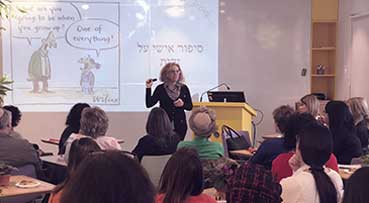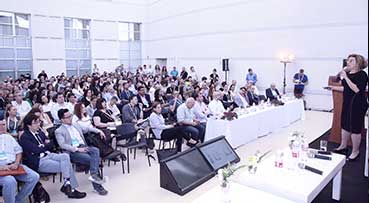The screen goes on, and a woman wearing a mask appears on the other side of the Zoom call. “Why wear a mask on a Zoom call from home?” I ask. “I have Covid, so I have to stay in quarantine.” That meeting wasn’t critical or even urgent and yet it appears we’ve reached a point where it becomes a new normal to work while ill. You’re home either way, so why not work?
Is this a positive or negative development? Depends on who you ask. Employees complain about their workload. Organizations want to ensure that nothing interferes with work. For two years now we’ve all been trying to prove that we can still be productive while working under abnormal conditions. Yet it probably doesn’t work for either party. Employees are resigning in larger numbers than ever before, noting, among other reasons, that they are no longer willing to continue at the current pace. Employers, on the other hand, are trying to come up with ways to bring them back to the office, thinking it will eliminate the problem.
In the midst of this new world, new voices suggest we have to try something completely different: slowing down. Actually doing less to do more.
The need to limit working hours isn’t a new idea, nor is the need to slow down. Over years legislation has reduced weekly working hours and increased vacation days. It is also evident in the employment terms of organizations, at least the enlightened ones. Over time they have increased paid time off components such as unlimited vacation days, gradual return from maternity leave, the option to take unpaid time off, sabbaticals etc.. In his book “In Praise of Slowness”, Carl Honoré outlines the development of the “slow movement” around the world from the beginning in the 1980s. It started with the concept of “slow food” in response to the fast food trend and spread to other areas, including work. Honoré calls it “slow work”. His Ted talk on the subject from 2005 has garnered over 3.2 million views, likely because he talks about the price we pay for rushing through life instead of living it.
These ideas, however, didn’t stick, at least not in cultures in which the constant race to succeed cannot coexist with the desire to work less. Even now, after Covid, one can still see organizations claiming work cannot be done differently, arguing that the idea of hybrid work doesn’t fit the “who we are”. Even though in many cases both the content and formats of the jobs can actually be performed from anywhere. Unlike other jobs which are closely attached to the physical workplace such as factory or retail jobs. Truth be told, what these organizations are saying is that it is not really possible to “work hard” when working from home, and that in order to succeed one must “work hard” from the office.
The current labor market may change the picture. It is possible that the slowdown created by Covid due to the lockdowns and the increased burnout will cause knowledge workers to at least demand more time for rest, retraining, and leisure.
One of the responses to this trend can already be seen in the form of the discussion of a 4-day work week. This has recently turned from an esoteric experiment to a bill in the US Congress – a proposal to amend the Working Hours Act from 40 to 32 working hours per week. In Israel, for comparison, the work week is calculated on a 42-hour basis. Such an amendment would immediately improve the wages of the hourly workers, who would earn more overtime. However, the real goal of the bill is to change the work culture and make the idea of a 4 day work week the norm. The initiator of the law, Rep. Mark Takano, explained that after two years of the pandemic, which forced many to explore other options, it can be said with confidence that it’s impossible and unnecessary to return to what was once normal, but did not necessarily work.
The question is whether limiting working hours to a four-day work week will allow people to reduce workload and work differently. While the legislative system was designed to protect workers and secure their rights, it was technology that drove us to the exact opposite . Although tech advancements freed us from the need to sit at our desks in the office and supposedly gave us the flexibility to better manage our work and leisure, they also enabled and encouraged us to work around the clock. Instead of our time being controlled by a punch card, today it’s controlled by the screen time, the rate of incoming information on the various channels and the need to respond to all of these anytime and anywhere. We constantly feel that we need to be attentive and busy. And this need leads us to burnout.
This problem will not be solved by a four-day work week. Because the problem is not in how many hours we are required to work. It lies in the amount of work we have and in the volume of communication around it.
The Covid-led shift to new and unfamiliar forms of work – first work from home and now perhaps a hybrid work model – only continued this trend. We are constantly increasing the amount of work we do around the work, instead of doing the work. What used to take five minutes in a hallway conversation now requires more steps and more coordination. If you pause to examine your schedule, you may find that most of your time is spent in meetings, conversations, coordination and correspondence. Or in other words, that most of your time is used “talking about work” and not about “doing work.” So if you spent a day working from home on eight hours of continuous Zoom calls, how can you expect not to feel drained at the end of the day?
In fact, it was the great experiment of working from home during Covid that proved that a four-day workweek would not solve our problem. When the pandemic arrived, it added new variables and constraints and we tried our best to squeeze out the same amount of work to prove that we are still productive. Shortening a work week to four days without regard to the scope of work will do the same thing: it will require us to cram an equal amount of work into four days and perhaps turn a blind eye when we catch up on work on our days off.
So if a four day workweek will not help us, is there no way out of this fast moving pace of work? Cal Newport, a professor of computer science at Georgetown University, has been writing bestsellers for years about the intersection of technology and culture, including books such as “Deep Work” and “A World Without Email”. In an article he published in the New Yorker, he invites us to once again slow down.
Do less, not more. And in doing so, you will be more productive. How?
The main goal is to work at a level of productivity that we can sustain over time. You’re probably thinking that we will lower the bar we, and the organization, will not be competitive. But Newport’s claim is that raising the bar created so much background noise that we have become inefficient. , Not to mention workload and burnout that resulted in the great resignation. According to this logic, if we lower the demands on each employee, we will actually give them more time to get the job done. Consequently, this will increase the quality of the outcomes, satisfaction and commitment. So essentially, we will increase the rate at which employees successfully complete tasks. In other words, reducing the volume of work assigned to employees will eventually increase their efficiency.
The challenge of “Slow Productivity” is that it requires organizations to find new ways to manage the now unassigned work. This is an additional incentive for better automation and prioritization, as well as prioritization and the removal of redundant tasks. Yes, the pandemic helped us to uncover dozens of tasks that, while could not be performed from home, were also not missed. They never got done, and no one noticed!…
The Omicron variant continues to teach us what the pandemic has been teaching us for the past two years: the world has changed. We can not assume that we can keep doing what we were doing or rely on old models of behavior that used to work for us. Perhaps, now is the perfect time to stop thinking about productivity as “working hard” with levels of speed and energy. Perhaps it’s time to actually turn in the opposite direction – reduce the amount of tasks, slow down the pace, and take it one day at a time.

![large-AX1A2125-2[1] large-AX1A2125-2[1]](https://niritcohen.com/wp-content/uploads/elementor/thumbs/large-AX1A2125-21-pnzedcs72atx5aeurqytqdiihxixlq02re9mlz805s.jpg)






